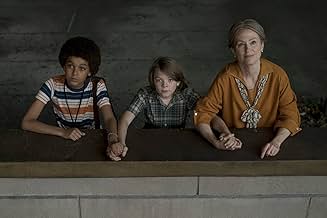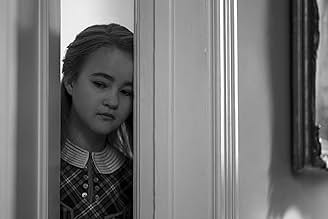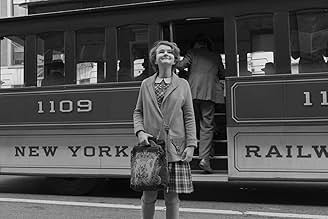NOTE IMDb
6,2/10
11 k
MA NOTE
L'histoire de deux enfants à cinquante ans d'écart. En 1927, Rose cherche l'actrice dont elle suit et raconte la vie dans son album. En 1977, Ben s'enfuit de chez lui pour retrouver son père... Tout lireL'histoire de deux enfants à cinquante ans d'écart. En 1927, Rose cherche l'actrice dont elle suit et raconte la vie dans son album. En 1977, Ben s'enfuit de chez lui pour retrouver son père.L'histoire de deux enfants à cinquante ans d'écart. En 1927, Rose cherche l'actrice dont elle suit et raconte la vie dans son album. En 1977, Ben s'enfuit de chez lui pour retrouver son père.
- Réalisation
- Scénario
- Casting principal
- Récompenses
- 1 victoire et 35 nominations au total
Résumé
Reviewers say 'Wonderstruck' is a visually and emotionally rich film exploring childhood, loss, and identity through dual narratives set in 1927 and 1977. The artistic direction, contrasting black and white with color, and the performances, especially Millicent Simmonds, are praised. Music and sound design enhance the atmosphere. However, some find the pacing slow and plot convoluted, making it a divisive yet beautifully crafted film.
Avis à la une
...but it is far from a failure.
Usually, I refrain from commenting on films which I have been fortunate enough to see prior to release, but in this case, I am making an exception.
The early reviews I have seen, including the two posted here, realize that the work product is indeed problematic, and, while they don't say so, they ought to understand that it should have been reworked before the final edit. What they clearly DON'T understand is that Wonderstruck is a fantasy, not a melodrama. Are the two children real? Hardly. All the capers and coincidences and similarities are unbelievable for any realistic narrative. That doesn't matter. Wonderstruck is not credible story; it isn't supposed to be. In music, a composition like this would be "a fantasy on" some composition. We would hear identifiable themes set in a very expansive framework, creating a very different impression of a familiar setting. That's what Wonderstruck intends to do - establish a real world in which the deaf find themselves contained. It's not set up to accommodate them, so they adapt their own reality to exist in it. Is their reality real? To those of us who are not deaf, we can never know what it is to them. So how much of Wonderstruck is real and how much is fantasy, we will never really know. That's the point.
Now, having said that, the film does have problems, not the least of which is that the book's author, Brian Selznick, wrote the screenplay, rarely a good idea without at least having an uninvolved writing partner. He had two problems, both of which handicapped him. He was faced with adapting a 600+ page book into a 2-hour film. A lot of stuff had to be excised, and the original author is the entirely wrong person to be doing it. Author Brian Seltzer knows the material too intimately and is not prepared to inform us of basic information which he has long ago accepted as obvious. Moreover, book structure - and screenwriter Brian Seltzer seems to have adhered closely to it in this case - rarely work for films. Books move slowly. Books let the reader consume the information at his/her own pace, even allowing for back-reference for clarity. Movies dictate our comprehension and understanding. Few novelists get this, and it was Seltzer's main problem.
In the theatre, plays and musicals go "out-of-town" to "try out", the whole purpose being that the show can be viewed in action. The problems can become obvious, and the writers can get to work on fixing them. Films don't have this luxury. True, the final edit can be exhibited for test audiences, but these viewers are very aware of their exceptional status, and they are rarely a good cross section of the viewing public. Wonderstruck could have benefited from an "out-of-town" tryout - even several of them. Unfortunately, this is not a financial expenditure available to most films. Moreover, it would probably lay the film open to reviewers - both professional and amateur - who would delight in their chance to make a difference. (Don't believe it? How credible is Rotten Tomatoes?) Several reviewers have disparaged the talents of the child actors. These commentators have very little credibility in this respect. The intent of the author is that the kids be very ordinary, very everyday. Regular kids are as diverse as adults, but they are not adults; they are still learning how to be adults. They may go off on some adventure that seems quite obvious to them while appearing unacceptable, even ridiculous, to adults. The young actors here were often handicapped by unspeakable dialogue, especially for 12-year-olds. They did everything they could with it because it was not their job to change it or object to it. A good dialogue writer - even a good director - would have realized this and made the changes. (And it is amazing that a director of Todd Haynes' quality missed it - or at least didn't do something about it.) While Millicent Simmonds (Young Rose) is deaf, Oakes Fegley (Ben) presumably has no hearing disability. As an actor he had to convey the confusion he must feel at suddenly being unable to hear but still being able to speak - and within a few months time at that. He obviously had access to a qualified "coach", but he had to replicate a young boy suddenly faced with a life changing disability. I wonder if they were able to find a 12-year-old boy - suddenly deaf - who could have helped him. Probably not. So his reactions were probably his own, and for a young boy in those circumstances, his portrayal was probably as accurate as any. (Interestingly, the boy - Ben - in the book is born deaf in one ear, who suddenly becomes totally deaf. Had that been the film's character, perhaps the actor's task would have been much different.) In summary, Wonderstruck is not a bad film, just not quite ready for prime time. It is quite enjoyable on its own terms.
Usually, I refrain from commenting on films which I have been fortunate enough to see prior to release, but in this case, I am making an exception.
The early reviews I have seen, including the two posted here, realize that the work product is indeed problematic, and, while they don't say so, they ought to understand that it should have been reworked before the final edit. What they clearly DON'T understand is that Wonderstruck is a fantasy, not a melodrama. Are the two children real? Hardly. All the capers and coincidences and similarities are unbelievable for any realistic narrative. That doesn't matter. Wonderstruck is not credible story; it isn't supposed to be. In music, a composition like this would be "a fantasy on" some composition. We would hear identifiable themes set in a very expansive framework, creating a very different impression of a familiar setting. That's what Wonderstruck intends to do - establish a real world in which the deaf find themselves contained. It's not set up to accommodate them, so they adapt their own reality to exist in it. Is their reality real? To those of us who are not deaf, we can never know what it is to them. So how much of Wonderstruck is real and how much is fantasy, we will never really know. That's the point.
Now, having said that, the film does have problems, not the least of which is that the book's author, Brian Selznick, wrote the screenplay, rarely a good idea without at least having an uninvolved writing partner. He had two problems, both of which handicapped him. He was faced with adapting a 600+ page book into a 2-hour film. A lot of stuff had to be excised, and the original author is the entirely wrong person to be doing it. Author Brian Seltzer knows the material too intimately and is not prepared to inform us of basic information which he has long ago accepted as obvious. Moreover, book structure - and screenwriter Brian Seltzer seems to have adhered closely to it in this case - rarely work for films. Books move slowly. Books let the reader consume the information at his/her own pace, even allowing for back-reference for clarity. Movies dictate our comprehension and understanding. Few novelists get this, and it was Seltzer's main problem.
In the theatre, plays and musicals go "out-of-town" to "try out", the whole purpose being that the show can be viewed in action. The problems can become obvious, and the writers can get to work on fixing them. Films don't have this luxury. True, the final edit can be exhibited for test audiences, but these viewers are very aware of their exceptional status, and they are rarely a good cross section of the viewing public. Wonderstruck could have benefited from an "out-of-town" tryout - even several of them. Unfortunately, this is not a financial expenditure available to most films. Moreover, it would probably lay the film open to reviewers - both professional and amateur - who would delight in their chance to make a difference. (Don't believe it? How credible is Rotten Tomatoes?) Several reviewers have disparaged the talents of the child actors. These commentators have very little credibility in this respect. The intent of the author is that the kids be very ordinary, very everyday. Regular kids are as diverse as adults, but they are not adults; they are still learning how to be adults. They may go off on some adventure that seems quite obvious to them while appearing unacceptable, even ridiculous, to adults. The young actors here were often handicapped by unspeakable dialogue, especially for 12-year-olds. They did everything they could with it because it was not their job to change it or object to it. A good dialogue writer - even a good director - would have realized this and made the changes. (And it is amazing that a director of Todd Haynes' quality missed it - or at least didn't do something about it.) While Millicent Simmonds (Young Rose) is deaf, Oakes Fegley (Ben) presumably has no hearing disability. As an actor he had to convey the confusion he must feel at suddenly being unable to hear but still being able to speak - and within a few months time at that. He obviously had access to a qualified "coach", but he had to replicate a young boy suddenly faced with a life changing disability. I wonder if they were able to find a 12-year-old boy - suddenly deaf - who could have helped him. Probably not. So his reactions were probably his own, and for a young boy in those circumstances, his portrayal was probably as accurate as any. (Interestingly, the boy - Ben - in the book is born deaf in one ear, who suddenly becomes totally deaf. Had that been the film's character, perhaps the actor's task would have been much different.) In summary, Wonderstruck is not a bad film, just not quite ready for prime time. It is quite enjoyable on its own terms.
How is a Todd Haynes film with a character based on Lillian Gish this bad? And why is this his follow-up to Carol?!
This YA mystery – adapted by its author – has an intriguing dual- time structure, a nice Carter Burwell score and some neat nods to silents, but it's also cloying, not very mysterious, and incredibly longwinded: not trusting its audience to understand anything, and struggling with some laborious translation problems reminiscent of Le mèpris, in which a lot of the dialogue has to be written down and held up. It doesn't help that the central kid seems to have wandered in from a school play. Or that it ends up looking like an extended advertorial for some museums.
It's sort of like Hugo, if everything that Scorsese's film had done had gone a bit wrong.
(The Gish films being homaged, incidentally, are primarily The Wind (the poster of the film-within-a-film starring 'Lillian Mayhew' is based directly on a publicity image for this 1928 masterpiece) and Orphans of the Storm, though she played mothers in few of her starring vehicles and Wonderstruck diverts considerably from her real life.)
This YA mystery – adapted by its author – has an intriguing dual- time structure, a nice Carter Burwell score and some neat nods to silents, but it's also cloying, not very mysterious, and incredibly longwinded: not trusting its audience to understand anything, and struggling with some laborious translation problems reminiscent of Le mèpris, in which a lot of the dialogue has to be written down and held up. It doesn't help that the central kid seems to have wandered in from a school play. Or that it ends up looking like an extended advertorial for some museums.
It's sort of like Hugo, if everything that Scorsese's film had done had gone a bit wrong.
(The Gish films being homaged, incidentally, are primarily The Wind (the poster of the film-within-a-film starring 'Lillian Mayhew' is based directly on a publicity image for this 1928 masterpiece) and Orphans of the Storm, though she played mothers in few of her starring vehicles and Wonderstruck diverts considerably from her real life.)
Unbelievably dull. Turned it off. Don't bother. Nothing positive to say. Save your time and money.
10asrashid
I absolutely love this movie. David Ehrlich wrote:"This is a soul-stirring and fiercely uncynical film that suggests the entire world is a living museum for the people we've lost, and that we should all hope to leave some of ourselves behind in its infinite cabinet of wonders". I couldn't have said it better myself. Of course it is a bit slow and maybe too complicated for a kid (it's definitely not for everyone). But A LOT of people actually love The Greatest Showman or another rubbish...I am 25 years old - I watched it with my mother who is 60 years old and we enjoed it. The ending is quite outstanding in my opinion. Everyone involved did such a beautiful job.
10Dollyrkr
This film was positively wonderful. I am dumbstruck at it's IMDB rating.
For crying out loud it's a magical children's tale with a soundtrack that includes Brian Eno/Robert Fripp and 70s soul jams. It's disability-positive, the way the sound is done to convey deaf children navigating NYC is extremely creative and well done. The art and scenes are what I worshipped as a child - my greatest fantasy was to find a secret room in a museum and stay the night! And the dioramas and the incredible way they wove them into the storytelling! The people saying "nothing dramatic happens" are seriously off their rockers - a kid loses his hearing!!! two deaf children run away to NYC!!! how on Earth is that not dramatic?
This film made me cry and laugh and feel like a child again. It's beautiful. If you have a child, watch it with them. If you don't, like me, watch it and feel like a kid again.
Le saviez-vous
- AnecdotesIn the book, the story of Rose is told alternatively without text but with graphics to allow the readers to experience Rose's story in the same way she felt escaping to New York City through her eyes and the silence of her life.
- GaffesWhen Ben enters the rotunda of the American Museum of Natural History, he walks past the mounted skeletons of the Allosaurus attacking a Barosaurus defending its young, as seen in the museum today. However, this exhibit was not mounted until 1991, and wouldn't have been seen in 1977.
- ConnexionsFeatured in WatchMojo: Top 10 Failed Oscar Bait Movies of 2017 (2018)
Meilleurs choix
Connectez-vous pour évaluer et suivre la liste de favoris afin de recevoir des recommandations personnalisées
- How long is Wonderstruck?Alimenté par Alexa
Détails
- Date de sortie
- Pays d’origine
- Sites officiels
- Langues
- Aussi connu sous le nom de
- Wonderstruck
- Lieux de tournage
- Sociétés de production
- Voir plus de crédits d'entreprise sur IMDbPro
Box-office
- Montant brut aux États-Unis et au Canada
- 1 060 377 $US
- Week-end de sortie aux États-Unis et au Canada
- 65 882 $US
- 22 oct. 2017
- Montant brut mondial
- 3 285 916 $US
- Durée
- 1h 56min(116 min)
- Couleur
- Mixage
- Rapport de forme
- 2.35 : 1
Contribuer à cette page
Suggérer une modification ou ajouter du contenu manquant





























